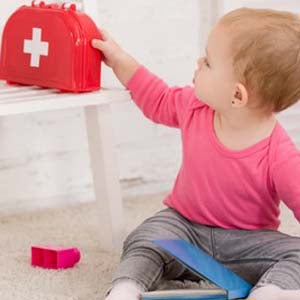Paediatric First Aid Training (0-18years)
Paediatric First Aid Training (0-18years)
Couldn't load pickup availability



Description
One of the primary objectives of pediatric first aid training is to address the unique anatomical and physiological differences between children and adults. Infants and children have distinct medical needs and may require specialized interventions and techniques to ensure optimal care and outcomes. Pediatric first aid courses cover topics such as age-appropriate assessment, treatment, and communication strategies tailored to the pediatric population.
Cardiopulmonary resuscitation (CPR) is a critical component of pediatric first aid training. Participants learn how to perform CPR on infants, children, and adolescents, including the appropriate compression-to-ventilation ratios and techniques for managing airway obstruction. CPR certification is essential for anyone who cares for children, whether at home, school, or in a professional childcare setting.
Choking is a common emergency in pediatric populations, particularly in infants and young children who may put small objects or food items in their mouths. Pediatric first aid training teaches participants how to recognize and respond to choking emergencies, including the appropriate techniques for clearing the airway and performing abdominal thrusts (Heimlich maneuver) in infants, children, and adolescents.
In addition to CPR and choking management, pediatric first aid training covers a wide range of topics relevant to the care of children, including:
- Wound care: Participants learn how to assess and manage various types of wounds and injuries commonly seen in children, such as cuts, scrapes, burns, and insect bites. Proper wound cleaning, dressing, and bandaging techniques are emphasized to prevent infection and promote healing.
- Fracture management: Pediatric first aid courses teach participants how to recognize signs and symptoms of fractures and provide appropriate first aid care, including immobilization techniques using splints or slings. Participants learn how to assess for deformity, swelling, and loss of function, as well as how to minimize pain and discomfort in the injured child.
- Allergic reactions: Anaphylaxis and severe allergic reactions can be life-threatening in children with allergies to foods, insect stings, or medications. Pediatric first aid training includes instruction on how to recognize the signs and symptoms of an allergic reaction and administer epinephrine (EpiPen) in emergency situations.
- Fever management: Fevers are common in children and can sometimes indicate underlying illness or infection. Pediatric first aid courses teach participants how to assess and manage fevers in children, including appropriate temperature measurement techniques, fever-reducing medications, and when to seek medical attention.
- Seizure management: Seizures can occur in children due to various medical conditions, such as epilepsy or febrile illnesses. Pediatric first aid training covers how to recognize different types of seizures, ensure the safety of the child during a seizure, and provide appropriate first aid care, including positioning and monitoring.
Pediatric first aid training is available through various organizations, including the American Red Cross, the American Heart Association, and childcare providers. These courses are typically taught by certified instructors and may include both theoretical knowledge and hands-on practical skills training. By empowering caregivers, parents, educators, and healthcare professionals with the skills to respond effectively to pediatric emergencies, pediatric first aid training helps ensure the safety and well-being of children in various settings.

